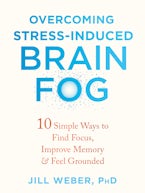By Jill P. Weber, PhD, author of Overcoming Stress-Induced Brain Fog
What starts as earnest ambition and a healthy desire to succeed can quickly become a constant effort to problem-solve and plan for every foreseeable outcome. Working to fix and overengineer to such an extent leaves people unable to relax. As a result, for a sense of relief they often have to turn to numbing out by way of alcohol, overeating, bingeing on TV, etc.
Missing from this pinball bouncing between over-fixing and numbing out is true meaning, connection, and feeling present in one’s life. Over the years, too much caffeine, not enough sleep, and around-the-clock micromanaging leaves people entirely depleted and cut off from the things that make life worth living.
If you notice you’re in this pattern, take a step back. Ask yourself if deep down you believe that to be successful in your work, family, or social pursuits, you need to be “on it” all of the time. Are you anticipating which shoe will drop next? Are you perpetually planning in your head? Are you engaging in problem-solving for a disproportionate amount of your day-to-day life?
There’s nothing wrong with working hard, but if the ratio is more in the overengineering direction than in the meaning, connection, and belonging direction, you might be less happy and less focused than you deserve and could be.
Here are three steps that will bring greater clarity and well-being, while you also pursue your goals and success:
- Start a daily relaxation ritual: It can feel like the only way to stay on top of things is to sprint through your tasks and responsibilities. This kind of dedication and perpetually “taking the bull by the horns” may feel like success and productivity. In reality, people who are highly successful have a mechanism to relax and unplug—that unlike numbing out—is rejuvenating. Allowing yourself a relaxation ritual makes it more likely that you can smoothly get into a flow when you do return to your work. A flow state is not based on grit, but a more present and embodied approach to tasks that allows you to find a measure of joy in your work. Start with ten minutes of noticing and observing your breath, or a ten-minute walk where you observe nature.
- Pause: Many who are obsessively goal driven believe they need to run at one hundred mph, crash at night, and then the next day immediately put the pedal to the metal. Start undoing this wiring by pausing and reflecting. For example, each time you get into your car, or you step outside, take in your surroundings, breathe. You will see that just making little moments for yourself brings happiness and a measure of gratitude for what you have.
- Make small talk: When we prioritize efficiency and accomplishment over relationships, we suffer. We forget that our brains expect that we will have close others in our life, and when we don’t, clarity and focus decline. And too, you may be surrounded by people, but that doesn’t mean you are really connecting. Start by taking time to make small talk with neighbors, friends, and colleagues. Make a point to spend five to ten minutes really being present with a person. Over time, you’ll feel the benefits and you will extend this out to other people in your life.
Rethinking your approach to success can make all the difference.
Jill P. Weber, PhD, is a clinical psychologist in private practice in Washington, DC; working with people managing varying degrees of anxiety. She is author of Be Calm, writes a blog for Psychology Today, and has appeared as a psychology expert in USA Today, The Washington Post, and on CNN. For more information, visit www.drjillweber.com.



 Part 2: What to Do When a Client Is Participating in Self-Judgment?
Part 2: What to Do When a Client Is Participating in Self-Judgment?